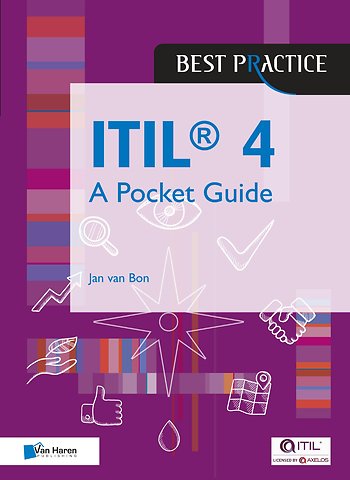


Jan van Bon studeerde in 1979 af als biomathematicus, waarna hij als onderzoeker aan de Rijksuniversiteit Groningen verschillende projecten voor de overheid uitvoerde.
Meer over Jan van BonITIL4 - A Pocket Guide
E-book Pdf met watermerkbeveiliging Engels 2019 1e druk 9789401804400Samenvatting
The ITIL pocket guides of Van Haren Publishing are since long recognized as the industry classic guide on the topic of ITIL, in many languages. Over the years this authoritative guide has earned its place on the bookshelves and in the briefcases of industry experts as they implement best practices within their organizations.
This pocket guide will provide readers with an understanding of the ITIL 4 service management framework, by:
- understanding the key concepts of service management
- understanding how the seven ITIL guiding principles can help an organization adopt and adapt service management
- understanding the four dimensions of service management
- understanding the purpose and components of the ITIL service value system
- understanding the six activities of the service value chain, and how they interconnect
- knowing the purpose and key terms of 15 of the 34 ITIL practices
- understanding seven of these 15 ITIL practices in detail
All exam requirements for the ITIL 4 Foundation exam are covered in this pocket guide. It also provides support for everyone who has knowledge of previous ITIL editions and is looking for a bridge to the new edition. ITIL 4 took a big leap into the modern world of IT service management, covering the latest principles and practices in a customer-focused, service-centric way, enabling Agile principles for maximum support of any business.
Trefwoorden
itil it service management service management best practices service value system certificering practices service value chain digitale transformatie guiding principles incident management change management problem management value creation continual improvement service desk governance service level management agile stakeholder management risk management configuration management
Trefwoorden
Specificaties
Lezersrecensies
Inhoudsopgave
U kunt van deze inhoudsopgave een PDF downloaden
1 INTRODUCTION 15
1.1 The ITIL 4 framework 16
1.1.1 The ITIL service value system (SVS) 16
1.1.2 The four dimensions model 17
2 KEY CONCEPTS OF SERVICE MANAGEMENT 19
2.1 Value co-creation 20
2.2 Stakeholders 21
2.2.1 Service providers 21
2.2.2 Service consumers 22
2.2.3 Other stakeholders 22
2.3 Products and services 23
2.3.1 Service offerings 23
2.4 Service relationships 24
2.4.1 The service relationship model 26
2.5 Value 26
2.5.1 Outcomes 27
2.5.2 Costs 28
2.5.3 Risks 28
2.5.4 Utility and warranty 29
3 THE FOUR DIMENSIONS OF SERVICE MANAGEMENT 31
3.1 Organizations and people 32
3.2 Information and technology 33
3.3 Partners and suppliers 35
3.4 Value streams and processes 36
3.5 External factors 38
4 THE ITIL SERVICE VALUE SYSTEM 39
4.1 Service value system overview 39
4.2 Opportunity and demand 40
4.3 The ITIL guiding principles 41
4.4 Governance 44
4.5 Service value chain 45
4.5.1 Plan 46
4.5.2 Improve 47
4.5.3 Engage 48
4.5.4 Design and transition 49
4.5.5 Obtain/build 50
4.5.6 Deliver and support 51
4.6 Value streams and the service value chain 51
4.7 Continual improvement 52
4.8 Practices 53
5 ITIL MANAGEMENT PRACTICES 55
5.1 General management practices 57
5.1.1 Architecture management 58
5.1.2 Continual improvement59
5.1.3 Information security management 61
5.1.4 Knowledge management 62
5.1.5 Measurement and reporting 62
5.1.6 Organizational change management 63
5.1.7 Portfolio management 64
5.1.8 Project management 64
5.1.9 Relationship management 65
5.1.10 Risk management 66
5.1.11 Service financial management 66
5.1.12 Strategy management 67
5.1.13 Supplier management 67
5.1.14 Workforce and talent management 68
5.2 Service management practices 69
5.2.1 Availability management 71
5.2.2 Business analysis 71
5.2.3 Capacity and performance management 72
5.2.4 Change control 73
5.2.5 Incident management 75
5.2.6 IT asset management 76
5.2.7 Monitoring and event management 77
5.2.8 Problem management 79
5.2.9 Release management 81
5.2.10 Service catalogue management 81
5.2.11 Service configuration management 82
5.2.12 Service continuity management 83
5.2.13 Service design 84
5.2.14 Service desk 85
5.2.15 Service level management 88
5.2.16 Service request management 89
5.2.17 Service validation and testing 91
5.3 Technical management practices 91
5.3.1 Deployment management 92
5.3.2 Infrastructure and platform management 93
5.3.3 Software development and management 94
5.4 Relationships between practices and service value chain activities 95
6 THE ITIL 4 FOUNDATION EXAM 99
6.1 Purpose 99
6.2 Conditions 100
6.3 Question types 100
6.4 Scoring 100
6.5 Preparation 101
6.6 Qualification scheme 101
7 DIFFERENCES WITH PREVIOUS ITIL VERSIONS 105
7.1 Changes to the list of processes/practices 107
8 GLOSSARY 111
ACRONYMS 135
REFERENCES 137
Vergelijkbare boeken
Anderen die dit e-book kochten, kochten ook
Rubrieken
- advisering
- algemeen management
- coaching en trainen
- communicatie en media
- economie
- financieel management
- inkoop en logistiek
- internet en social media
- it-management / ict
- juridisch
- leiderschap
- marketing
- mens en maatschappij
- non-profit
- ondernemen
- organisatiekunde
- personal finance
- personeelsmanagement
- persoonlijke effectiviteit
- projectmanagement
- psychologie
- reclame en verkoop
- strategisch management
- verandermanagement
- werk en loopbaan










